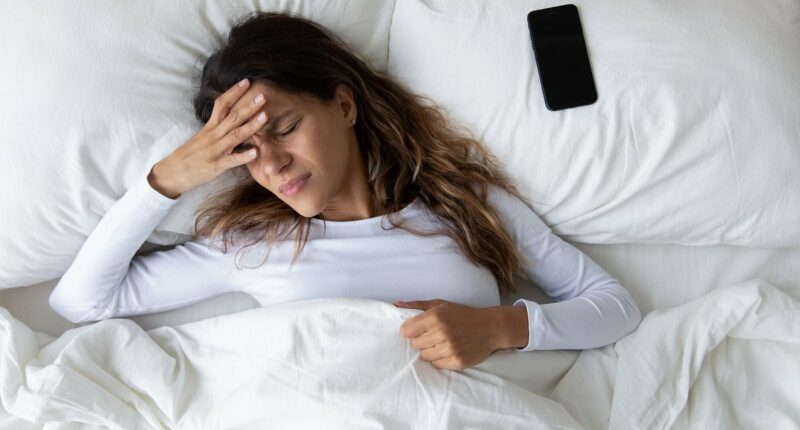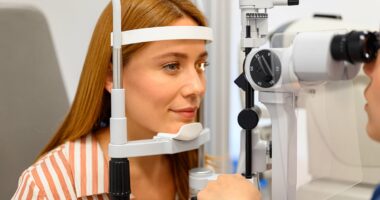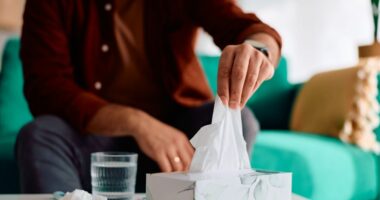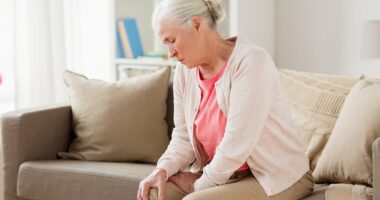Share this @internewscast.com
If you’re a victim of disturbed sleep, you could be in luck—one expert may have solved the mystery of why you can’t nod off.
Sleep experts have long recommended a few simple strategies to tackle insomnia: avoiding technology before bedtime, eliminating caffeine, and maintaining a consistent sleep schedule. Each of these has been suggested to improve sleep quality.
But now, one sleep researcher at Royal Holloway University of London has claimed these are not effective ways to ensure people get enough shuteye.
According to Kirsty Vant, five common hacks could even be making people’s insomnia worse.
When finding it difficult to nod off, it can be tempting to go to bed earlier or lie in later hoping to ‘catch up’.
‘But this strategy often backfires,’ she said.
Spending too much time awake in bed can weaken the mental connection between your bed and sleep, leading to frustration instead, as stated by experts.
Instead, people should go to bed a little later and wake up at the same time each morning.
Trendy sleep trackers are fuelling an increase in cases of orthosomnia—an obsession with sleeping correctly, experts have claimed
This approach enhances your body’s natural sleep drive, reinforcing the idea of the bed as a place for sleep rather than wakefulness, according to an expert speaking to The Conversation.
Similarly, researchers have advised turning off screens before bedtime since the blue light from these devices can hinder the production of melatonin, a crucial hormone for managing the sleep-wake cycle.
This kind of lighting can create sharp contrasts and shadows, which can strain vision, they argue.
Blue light exposure in the evening can disrupt your body’s natural bedtime signals, causing both physical and mental fatigue.
Nonetheless, ‘lying in the dark without any mental distraction can lead to increased anxiety and overthinking, which are known to exacerbate insomnia,’ according to Ms. Vant.
‘Rather than banning screens entirely, consider using them strategically.
‘Choose calming, non-stimulating content, use night-mode settings, and avoid scrolling mindlessly.’
Likewise, if people are sensitive to caffeine it is ‘wise’ to avoid later in the day.

Likewise, if people are sensitive to caffeine it is ‘wise’ to avoid later in the day, Ms Vant advised
Cutting it out altogether ‘isn’t always necessary’, she advised. Instead, ‘understanding your individual response is key’.
According to a recent sleep survey, around one in nine women in the UK—roughly 4.5 million—now use a sleep or health tracking app or device such as a watch to provide insights into their sleeping habits.
Sleep patterns are then presented on the app via diagrams that detail the minutes spent in the three sleep stages—light, deep and REM, with alerts often issued if users fail to reach the target of a specified number of nightly hours.
But trying ‘too hard to optimise sleep’ is fuelling an increase in cases of both insomnia and orthosomnia—an obsession with sleeping correctly, Ms Vant claimed.
‘Sleep is an autonomic function, like digestion or blood pressure.
‘While we can influence sleep through healthy habits, we can’t force it to happen. Becoming obsessed with sleep quality can paradoxically make it worse,’ she added.
‘Sometimes, the best approach is to care less about sleep – and let your body do what it’s designed to do.’
Expecting to sleep for a fixed number of hours every evening too, may be raising the risk of suffering insomnia, she said.

According to a recent sleep, around one in nine women in the UK—roughly 4.5 million—now use a sleep or health tracking app or device such as a watch to provide insights into their sleeping habits
‘Expecting rigid consistency from your sleep sets up unrealistic expectations. Some nights will be better than others – and that’s normal.
‘Healthy sleep isn’t a fixed number of hours—it’s dynamic and responsive to our lives.
‘Factors like stress, physical health, age, environment, and even parenting responsibilities all affect sleep,’ she said.
‘Insomnia is common and treatable—and no, it’s not your fault.’
People often take around 10 to 20 minutes normally to nod off after turning off the lights, the Sleep Foundation say.
Last year, a study found that around one in six Brits suffer insomnia, yet 65 per cent never seek help for their sleep problem.
The poll of 2,000 people, by The Sleep Charity, found nine in ten experience some sort of sleep problem, while one in two engage in high-risk or dangerous behaviours when unable to sleep.
Poor sleep has been linked to a number of health problems, including cancer, stroke and infertility.
Experts have long advised that waking up during the night does not necessarily mean you have insomnia, which figures suggest affects up to 14million Brits.
Still, sleep deprivation takes its own toll, from irritability and reduced focus in the short term, to an increased risk of obesity, heart disease and diabetes.
According to the American Sleep Association, nearly 70 million Americans also have a sleep disorder.















